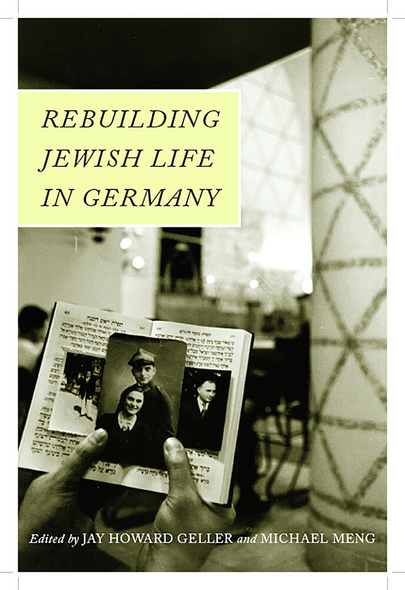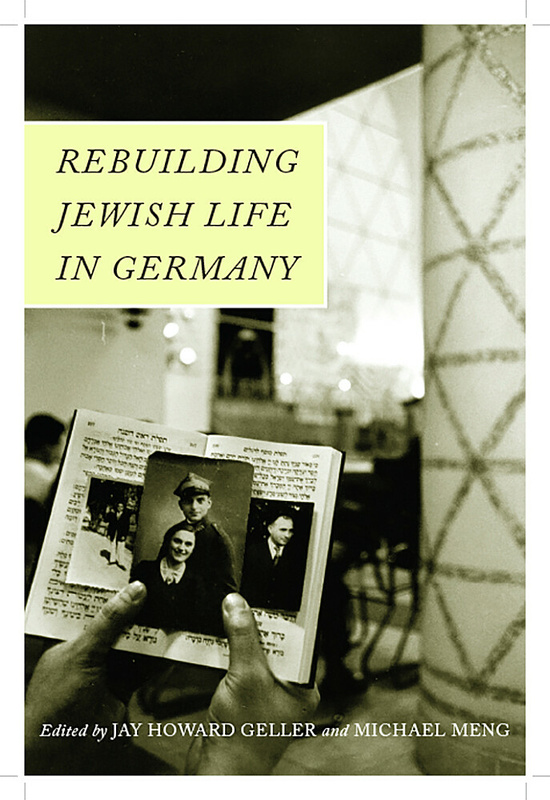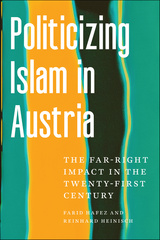
276 pages, 6 x 9
6 b&w photographs
Paperback
Release Date:14 Feb 2020
ISBN:9781978800717
Hardcover
Release Date:14 Feb 2020
ISBN:9781978800724
Rebuilding Jewish Life in Germany
Edited by Jay Howard Geller and Michael Meng
Rutgers University Press
Seventy-five years after the Holocaust, 100,000 Jews live in Germany. Their community is diverse and vibrant, and their mere presence in Germany is symbolically important. In Rebuilding Jewish Life in Germany, scholars of German-Jewish history, literature, film, television, and sociology illuminate important aspects of Jewish life in Germany from 1949 to the present day. In West Germany, the development of representative bodies and research institutions reflected a desire to set down roots, despite criticism from Jewish leaders in Israel and the Diaspora. In communist East Germany, some leftist Jewish intellectuals played a prominent role in society, and their experience reflected the regime’s fraught relationship with Jewry. Since 1990, the growth of the Jewish community through immigration from the former Soviet Union and Israel have both brought heightened visibility in society and challenged preexisting notions of Jewish identity in the former “land of the perpetrators.”
An original and important book.
A most welcome addition to the field, Rebuilding Jewish Life in Germany expands on the existing literature in crucial ways, allowing us to understand better the communal affairs, ideological proclivities, and identity politics of Jews in both Germanies after 1945.
If Jews are the canaries in the coalmine of German democracy, then this book chronicles the strength of their song. Seventy-five years after the Holocaust, these essays lay bare the trauma, conflicts, and remarkable resilience of Germany’s Jews. They are a must-read for anyone interested in the health of German democracy and its Jewish community.
The academic prose is readable in this well-edited collection, and authors work to clarify the sometimes confusing cultural and political aspects of the communities and literary productions they study. This makes several chapters particularly suitable for undergraduate reading, inviting junior scholars to investigate the field further. Recommended.
Provides important contributions to studies of post-1949 German Jewry in two key arenas: its chronological focus, which incorporates the 1990s and 2000s within the scope of postwar history, and its embrace of multiple academic disciplines, including literature studies, film and television studies, sociology, and history.
The editors rightly advocate to overcome the national perspective in the presentation of European-Jewish history and to replace it with a transnational comparative approach.
Jay Howard Geller is Samuel Rosenthal Professor of Judaic Studies and Professor of History at Case Western Reserve University, Cleveland, Ohio. He is the author of The Scholems: A Story of the German-Jewish Bourgeoisie from Emancipation to Destruction (Cornell University Press, 2019) and Jews in Post-Holocaust Germany, 1945-1953 (Cambridge University Press, 2005), as well as co-editor Three-Way Street: Jews, Germans, and the Transnational (University of Michigan Press, 2016).
Michael Meng is Associate Professor of History at Clemson University, Clemson, South Carolina. He is the author of Shattered Spaces: Encountering Jewish Ruins in Postwar Germany and Poland (Harvard University Press, 2011) and co-editor of Jewish Space in Contemporary Poland (Indiana University Press 2015) and co-editor of Modern Germany in Transatlantic Perspective (Berghahn Books, 2017), among other publications on modern European intellectual and cultural history.
Michael Meng is Associate Professor of History at Clemson University, Clemson, South Carolina. He is the author of Shattered Spaces: Encountering Jewish Ruins in Postwar Germany and Poland (Harvard University Press, 2011) and co-editor of Jewish Space in Contemporary Poland (Indiana University Press 2015) and co-editor of Modern Germany in Transatlantic Perspective (Berghahn Books, 2017), among other publications on modern European intellectual and cultural history.
Contents
Introduction
Jay Howard Geller and Michael Meng
Chapter 1: The Politics of Jewish Representation in Early West Germany
Jay Howard Geller
Chapter 2: We have the right to exist here: Jewish Politics and the Challenges of Wiedergutmachung in Post-Holocaust Germany
Andrea A. Sinn
Chapter 3: Bernhard Brilling and the Reconstruction of Jewish Archives in Postwar Germany
Jason Lustig
Chapter 4: Whose Heritage?: Early Postwar German-Jewish History as Remigrants’ History—The Case of Hamburg
Miriam Rürup
Chapter 5: Migration, Memory and New Beginnings: The Postwar Jewish Community in Frankfurt am Main
Tobias Freimüller
Chapter 6: Helmut Eschwege and Jewish Life in the German Democratic Republic
Alexander Walther
Chapter 7: Learning Years on the Path to Dissidence: Stefan Heym’s Friendship with Robert Havemann and Wolf Biermann
Cathy S. Gelbin
Chapter 8: Ernst Bloch’s Eschatological Marxism
Michael Meng
Chapter 9: Diasporic Place-Making in Barbara Honigmann
Katja Garloff
Chapter 10: Tur Tur’s Lantern on a Tiny Island: New Historiographical Perspectives on East German Jewish History
Constantin Goschler
Chapter 11: Community Responses to the Immigration of Russian-Speaking Jews to Germany, 1990–2006
Joseph Cronin
Chapter 12: Policing the East: The New Jewish Hero in Dominik Graf’s Crime Drama Im Angesicht des Verbrechens
Jill Suzanne Smith
Chapter 13: “You are my liberty:” On the Negotiation of Holocaust and Other Memories for Israelis in Berlin
Irit Dekel
Epilogue
Jay Howard Geller and Michael Meng
Introduction
Jay Howard Geller and Michael Meng
Chapter 1: The Politics of Jewish Representation in Early West Germany
Jay Howard Geller
Chapter 2: We have the right to exist here: Jewish Politics and the Challenges of Wiedergutmachung in Post-Holocaust Germany
Andrea A. Sinn
Chapter 3: Bernhard Brilling and the Reconstruction of Jewish Archives in Postwar Germany
Jason Lustig
Chapter 4: Whose Heritage?: Early Postwar German-Jewish History as Remigrants’ History—The Case of Hamburg
Miriam Rürup
Chapter 5: Migration, Memory and New Beginnings: The Postwar Jewish Community in Frankfurt am Main
Tobias Freimüller
Chapter 6: Helmut Eschwege and Jewish Life in the German Democratic Republic
Alexander Walther
Chapter 7: Learning Years on the Path to Dissidence: Stefan Heym’s Friendship with Robert Havemann and Wolf Biermann
Cathy S. Gelbin
Chapter 8: Ernst Bloch’s Eschatological Marxism
Michael Meng
Chapter 9: Diasporic Place-Making in Barbara Honigmann
Katja Garloff
Chapter 10: Tur Tur’s Lantern on a Tiny Island: New Historiographical Perspectives on East German Jewish History
Constantin Goschler
Chapter 11: Community Responses to the Immigration of Russian-Speaking Jews to Germany, 1990–2006
Joseph Cronin
Chapter 12: Policing the East: The New Jewish Hero in Dominik Graf’s Crime Drama Im Angesicht des Verbrechens
Jill Suzanne Smith
Chapter 13: “You are my liberty:” On the Negotiation of Holocaust and Other Memories for Israelis in Berlin
Irit Dekel
Epilogue
Jay Howard Geller and Michael Meng





